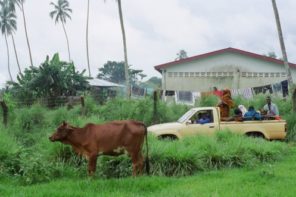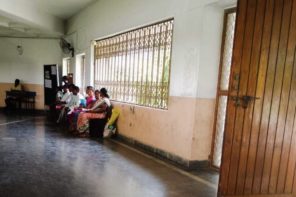While our newsfeed is filled with content related to the mid-term elections in the United States, President Trump’s xenophobic and racist discourse, and his politics of injury and death on the US-Mexico border,
there is an evident need to learn more about the context within which these politics occur, and it is vital to gain a better understanding of the consequences they produce.
We are thrilled about these ethnographies hot off the press that in different ways address the various terrains that these political debates aim to tackle. We are looking for fellow scholars who are interested in reviewing these exciting ethnographies that explore imperial formations related to the politics of the United States in general, and the various themes surrounding the United States-Mexico border in particular. Our list of works include an ethnography of emergency responders on the US-Mexico border (Jusionyte); a study that engages with the lives of those who have been deported (Cadwell); an ethnography of the discourses about migration and el Norte in a small industrial town Uriangato in Mexico (Parsons Dick); and a collection of ethnographies discussing the impacts of imperialist military and political interventions (McGranahan and Collins eds.)
We have also included ethnographies that engage with societal issues pertaining to racism, space, gender and religion in the various regions of the United States. An ethnography of African American queer women in the American South shows how they experience racial, sexual, gender, and class identities (Patrick Johanson), a study of public schools in Chicago reveals patterns of systemic racism and inequality – and the ongoing struggle against them (Ewing), an ethnography of the teaching of college writing in a prison tells us an untold story of people who are invisible to the general public (Perry), and the ethnography of the Black Pentecostal Church Coalition not only pays attention to gender and race but spirituality and faith too (Lewin).
Our review guidelines:
As we receive many requests for reviews, please write 2-3 sentences why you should be reviewing this book, indicating how it relates to your own research or interests.
Please send your expression of interest to: reviews@allegralaboratory.net
When submitting the review, please follow our guidelines:
The review is to be written within three months from the dispatch of the book.
Spelling: British English. Please use –ise and not –ize word endings.
Word limit: 750-1500 words.
Font: Times New Roman.
Size: 12.
Line Spacing: 1,5
No footnotes.
If you cite other authors, please reference their publication in the end.
Do not forget to include your name, (academic) affiliation, a photograph of yourself and a short bio of 2-3 sentences.
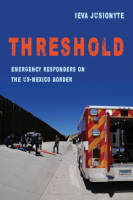
Emergency responders on the US-Mexico border operate at the edges of two states. They rush patients to hospitals across country lines, tend to the broken bones of migrants who jump over the wall, and put out fires that know no national boundaries. Paramedics and firefighters on both sides of the border are tasked with saving lives and preventing disasters in the harsh terrain at the center of divisive national debates.
Ieva Jusionyte’s firsthand experience as an emergency responder provides the background for her gripping examination of the politics of injury and rescue in the militarized region surrounding the US-Mexico border. Operating in this area, firefighters and paramedics are torn between their mandate as frontline state actors and their responsibility as professional rescuers, between the limits of law and pull of ethics. From this vantage point they witness what unfolds when territorial sovereignty, tactical infrastructure, and the natural environment collide. Jusionyte reveals the binational brotherhood that forms in this crucible to stand in the way of catastrophe. Through beautiful ethnography and a uniquely personal perspective, Threshold provides a new way to understand politicized issues ranging from border security and undocumented migration to public access to healthcare today.
Caldwel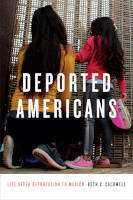
When Gina was deported to Tijuana, Mexico, in 2011, she left behind her parents, siblings, and children, all of whom are U.S. citizens. Despite having once had a green card, Gina was removed from the only country she had ever known. In Deported Americans legal scholar and former public defender Beth C. Caldwell tells Gina’s story alongside those of dozens of other Dreamers, who are among the hundreds of thousands who have been deported to Mexico in recent years. Many of them had lawful status, held green cards, or served in the U.S. military. Now, they have been banished, many with no hope of lawfully returning. Having interviewed over 100 deportees and their families, Caldwell traces deportation’s long-term consequences—such as depression, drug use, and homelessness—on both sides of the border. Showing how U.S. deportation law systematically fails to protect the rights of immigrants and their families, Caldwell challenges traditional notions of what it means to be an American and recommends legislative and judicial reforms to mitigate the injustices suffered by the millions of U.S. citizens affected by deportation.
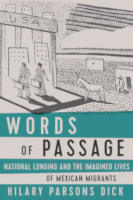
Migration fundamentally shapes the processes of national belonging and socioeconomic mobility in Mexico—even for people who never migrate or who return home permanently. Discourse about migrants, both at the governmental level and among ordinary Mexicans as they envision their own or others’ lives in “El Norte,” generates generic images of migrants that range from hardworking family people to dangerous lawbreakers. These imagined lives have real consequences, however, because they help to determine who can claim the resources that facilitate economic mobility, which range from state-sponsored development programs to income earned in the North.
Words of Passage is the first full-length ethnography that examines the impact of migration from the perspective of people whose lives are affected by migration, but who do not themselves migrate. Hilary Parsons Dick situates her study in the small industrial city of Uriangato, in the state of Guanajuato. She analyzes the discourse that circulates in the community, from state-level pronouncements about what makes a “proper” Mexican to working-class people’s talk about migration. Dick shows how this migration discourse reflects upon and orders social worlds long before—and even without—actual movements beyond Mexico. As she listens to men and women trying to position themselves within the migration discourse and claim their rights as “proper” Mexicans, she demonstrates that migration is not the result of the failure of the Mexican state but rather an essential part of nation-state building.
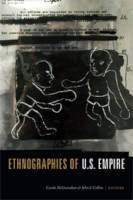
How do we live in and with empire? The contributors to Ethnographies of U.S. Empire pursue this question by examining empire as an unequally shared present. Here empire stands as an entrenched, if often invisible, part of everyday life central to making and remaking a world in which it is too often presented as an aberration rather than as a structuring condition. This volume presents scholarship from across U.S. imperial formations: settler colonialism, overseas territories, communities impacted by U.S. military action or political intervention, Cold War alliances and fissures, and, most recently, new forms of U.S. empire after 9/11. From the Mohawk Nation, Korea, and the Philippines to Iraq and the hills of New Jersey, the contributors show how a methodological and theoretical commitment to ethnography sharpens all of our understandings of the novel and timeworn ways people live, thrive, and resist in the imperial present.
Contributors: Kevin K. Birth, Joe Bryan, John F. Collins, Jean Dennison, Erin Fitz-Henry, Adriana María Garriga-López, Olívia Maria Gomes da Cunha, Matthew Gutmann, Ju Hui Judy Han, J. Kehaulani Kauanui, Eleana Kim, Heonik Kwon, Soo Ah Kwon, Darryl Li, Catherine Lutz, Sunaina Maira, Carole McGranahan, Sean T. Mitchell, Jan M. Padios, Melissa Rosario, Audra Simpson, Ann Laura Stoler, Fa’anofo Lisaclaire Uperesa, David Vine.
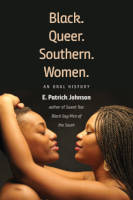
Drawn from the life narratives of more than seventy African American queer women who were born, raised, and continue to reside in the American South, this book powerfully reveals the way these women experience and express racial, sexual, gender, and class identities–all linked by a place where such identities have generally placed them on the margins of society. Using methods of oral history and performance ethnography, E. Patrick Johnson’s work vividly enriches the historical record of racialized sexual minorities in the South and brings to light the realities of the region’s thriving black lesbian communities.
At once transcendent and grounded in place and time, these narratives raise important questions about queer identity formation, community building, and power relations as they are negotiated within the context of southern history. Johnson uses individual stories to reveal the embedded political and cultural ideologies of the self but also of the listener and society as a whole. These breathtakingly rich life histories show afresh how black female sexuality is and always has been an integral part of the patchwork quilt that is southern culture.
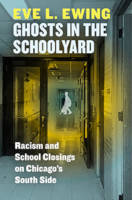
“Failing schools. Underprivileged schools. Just plain bad schools.”
That’s how Eve L. Ewing opens Ghosts in the Schoolyard: describing Chicago Public Schools from the outside. The way politicians and pundits and parents of kids who attend other schools talk about them, with a mix of pity and contempt.
But Ewing knows Chicago Public Schools from the inside: as a student, then a teacher, and now a scholar who studies them. And that perspective has shown her that public schools are not buildings full of failures—they’re an integral part of their neighborhoods, at the heart of their communities, storehouses of history and memory that bring people together.
Never was that role more apparent than in 2013 when Mayor Rahm Emanuel announced an unprecedented wave of school closings. Pitched simultaneously as a solution to a budget problem, a response to declining enrollments, and a chance to purge bad schools that were dragging down the whole system, the plan was met with a roar of protest from parents, students, and teachers. But if these schools were so bad, why did people care so much about keeping them open, to the point that some would even go on a hunger strike?
Ewing’s answer begins with a story of systemic racism, inequality, bad faith, and distrust that stretches deep into Chicago history. Rooting her exploration in the historic African American neighborhood of Bronzeville, Ewing reveals that this issue is about much more than just schools. Black communities see the closing of their schools—schools that are certainly less than perfect but that are theirs—as one more in a long line of racist policies. The fight to keep them open is yet another front in the ongoing struggle of black people in America to build successful lives and achieve true self-determination.
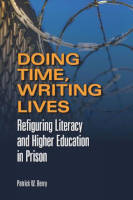
Doing Time, Writing Lives offers a much-needed analysis of the teaching of college writing in U.S. prisons, a racialized space that—despite housing more than 2 million people—remains nearly invisible to the general public. Through the examination of a college-in-prison program that promotes the belief that higher education in prison can reduce recidivism and improve life prospects for the incarcerated and their families, author Patrick W. Berry exposes not only incarcerated students’ hopes and dreams for their futures but also their anxieties about whether education will help them.
Combining case studies and interviews with the author’s own personal experience of teaching writing in prison, this book chronicles the attempts of incarcerated students to write themselves back into a society that has erased their lived histories. It challenges polarizing rhetoric often used to describe what literacy can and cannot deliver, suggesting more nuanced and ethical ways of understanding literacy and possibility in an age of mass incarceration.
In 2001, a collection of open and affirming churches with predominantly African American membership and a Pentecostal style of worship formed a radically new coalition. The group, known now as the Fellowship of Affirming Ministries or TFAM, has at its core the idea of “radical inclusivity”: the powerful assertion that everyone, no matter how seemingly flawed or corrupted, has holiness within. Whether you are LGBT, have HIV/AIDS, have been in prison, abuse drugs or alcohol, are homeless, or are otherwise compromised and marginalized, TFAM tells its people, you are one of God’s creations.
In Filled with the Spirit, Ellen Lewin gives us a deeply empathetic ethnography of the worship and community central to TFAM, telling the story of how the doctrine of radical inclusivity has expanded beyond those it originally sought to serve to encompass people of all races, genders, sexualities, and religious backgrounds. Lewin examines the seemingly paradoxical relationship between TFAM and traditional black churches, focusing on how congregations and individual members reclaim the worship practices of these churches and simultaneously challenge their authority. The book looks closely at how TFAM worship is legitimated and enhanced by its use of gospel music and considers the images of food and African American culture that are central to liturgical imagery, as well as how understandings of personal authenticity tie into the desire to be filled with the Holy Spirit. Throughout, Lewin takes up what has been mostly missing from our discussions of race, gender, and sexuality—close attention to spirituality and faith.
Featured image (cropped) by The All-Nite Images (flickr, CC BY-SA 2.0)



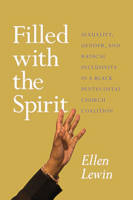 , Ellen. 2018. Filled with the Spirit: Sexuality, Gender and Radical Inclusivity in a Black Pentecostal Church Coalition. Chicago: University of Chicago Press.
, Ellen. 2018. Filled with the Spirit: Sexuality, Gender and Radical Inclusivity in a Black Pentecostal Church Coalition. Chicago: University of Chicago Press.


